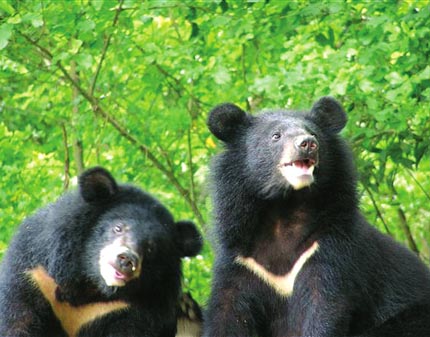Bear bile industry slowly dying
In a tranquil patch of woods in Chengdu, southwest China, 107 bears rest after a life of agony and incarceration.

The special cemetery of the Moon Bear Rescue Center, built by Animals Asia Foundation (AAF) in Sichuan Province, is for bears once farmed for their bile.
Three freed bears from a Shandong bear-bile farm were recently buried here after their rehabilitation at the center failed.
Liver cancers and organ failures, a result of years of painful bile extraction, finally claimed them, said Wang Fan, bear carer with the center.
The practice of extracting bear bile can be traced back to ancient times when people first started consuming the bile, which allegedly has curative effects for ailments such as eye and liver problems.
For over 3,000 years bears have been hunted in Asian countries for their gallbladders and the valuable bile within. Only in the 1980s, after rampant hunting greatly reduced their numbers, did countries like China and the Republic of Korea take steps to ban bear hunting.
But wild bears were then caught and farmed for their bile.
By the end of 2009, bear farming was still legal in 13 of Chinese mainland's 31 provinces, municipalities and autonomous regions, and bear-bile products can still be seen across China.
In Chengdu, bear-bile powder can sell for as high as 4,000 yuan (598 U.S. dollars) a kilogram. Some high-end alcohol and shampoo products also list bear bile as an ingredient.
"Most people think bear bile can cure disease, but have no idea how it is extracted from living bears," said Toby Zhang, Animals Asia's Director of External Affairs.
In April this year, the local authorities in Shandong persuaded, offering some compensation, a farm to release its bears, most of which had been hopelessly ill and could not produce much bile.
When the AAF rescuers arrived at the site, they found 10 sickened bears, caged in squalid sheds.
As a measure to prevent them from struggling during the "milking" process, the bears were totally constrained within wire cages the size of their bodies.
A hole had been carved in the bear's abdomen to allow a catheter to be inserted each day to extract the bile. The pain of the daily extraction, which could last hours each time, had made the bears shiver continuously.
And when the rescuers arrived, some bears had been in this living hell for over ten years.
The long incarceration and torturous extraction method caused many health problems for the bears, said Wang. Many died from liver cancer or abdominal infections shortly after being freed.
"The farmers had continued to drain bile from bears afflicted with cancers and injected excessive antibiotics into their bodies to keep them alive," said Xiong Beirong, an official with Sichuan Provincial Forestry Department.
"I doubt that bile from these bears can be good for health," said Xiong.
Actually, over 50 herbal and synthetic substitutes have been proved to have the same medical effect and are much cheaper than bear bile, many practitioners of traditional Chinese medicine (TCM) have said.
"The bear bile industry is totally unnecessary, and its brutal side has defamed TCM and the image of our country," said Huang Xinyang, vice president of the Taoist Association of China, in a proposal to the National Committee of the Chinese People's Political Consultative Conference, the country's top advisory body, this year.
Fortunately, 15 years after Jill Robinson, founder and CEO of AAF, first exposed the brutality of bear farms, the bear bile industry now has received more attention from the public and officials.
In 2000, government officials signed an agreement with the AAF on cooperation in bile bear rescues, the first of its kind signed between the Chinese government and international animal charities.
The Chinese authorities also agreed to issue no new licenses and work towards ending bear farming in the remaining 13 provinces where such practices are still allowed.
Earlier this year, four popular Chinese pharmacy chains have joined AAF's campaign by refusing to sell bear-bile products.
And with the ten saved from Shandong in April, the total number of AAF's rescued bears now tops 345. In the meantime, the number of bear farms in China has dropped to 65 from 480 in the mid-1990s, said an AAF report.
"We have never been more hopeful of seeing the last bear farm close," said Jill Robinson.
 0
0 






